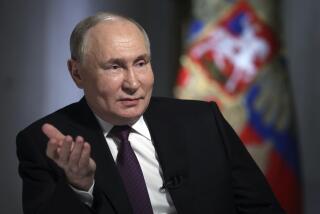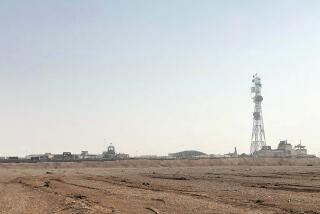Syria backs Russian proposal for regime to hand over chemical weapons
BEIRUT — The Syrian government said Monday that it backed a Russian proposal calling for Damascus to hand over its arsenal of chemical weapons to international authorities in a bid to avoid a U.S. attack.
“We, for the sake of protecting our people and children and country and due to our trust in the Russian efforts, will cooperate fully with Russia in this regard so as to take away the excuses of this aggression,” Syrian Foreign Minister Walid Moallem said in a statement.
Russia has been a staunch ally of Syrian President Bashar Assad.
There was no immediate U.S. response to the Russian-Syrian plan, which came on a day of fast-moving developments in the Syria crisis.
Russian Foreign Minister Sergei Lavrov, speaking in Moscow, floated the proposal that Syria place its international chemical stockpile under international supervision.
“We are calling on the Syrian authorities [to] not only agree on putting chemical weapons storages under international control, but also for its further destruction and then joining the Organization for the Prohibition of Chemical Weapons,” Lavrov said, referring to the international body that implements the Chemical Weapons Convention, agreed to by 189 nations, not including Syria.
The Russian foreign minister’s statement apparently came in response to comments in London by U.S. Secretary of State John F. Kerry.
Asked how Assad could avoid a strike, Kerry -- speaking in a tone that suggested he was speaking extemporaneously -- said: “Turn over every single bit of his chemical weapons to the international community, in the next week -- turn it over, all of it.”
However, Kerry added: “But he isn’t about to do it, and it can’t be done, obviously.”
At the United Nations, U.N. Secretary General Ban Ki-Moon reacted positively to the Russian initiative.
“I welcome these ideas,” Ban told reporters.
The U.N. chief said he was also “considering urging the Security Council to demand the immediate transfer of Syria’s chemical weapons and chemical precursor stocks to places inside Syria where they can be safely stored and destroyed.”
Syria has never publicly acknowledged possessing chemical weapons, though officials of the United States and other nations say Damascus has one of the world’s largest chemical arms programs. The former Soviet Union helped Syria, its long-time ally, build up its chemical arsenal, experts say.
Even while backing the Russian proposal, the Syrian foreign minister on Monday did not explicitly acknowledge that Syria had an arsenal of chemical weapons.
Any effort to remove Syria’s chemical stockpile would presumably face massive logistical challenges in the midst of a raging civil war.
Washington has accused Syria of launching a poison-gas attack on Aug. 21 in the suburbs of Damascus that killed hundreds. The Syrian government has denied carrying out any chemical attack and has blamed anti-government rebels, saying they are seeking to frame Assad and spur international intervention in the Syrian conflict.
President Obama is considering a series of punitive military strikes on Syria because of Damascus’ alleged deployment of chemical weapons. Syrian authorities say any U.S. attack would be an effort to tilt the balance in the more than two-year civil war in favor of anti-government insurgents, including Al Qaeda-linked groups.
In addition to its chemical weapons proposal, Russia has tried to use its clout as one of the world’s top nuclear powers to help allied Syria avert the threatened U.S. airstrikes. At a meeting in Vienna Monday of the 35-nation board of the International Atomic Energy Agency, Russian delegates asked the U.N. nuclear watchdog to investigate the risk to Syrian civilians if the threatened aerial bombardment should strike a nuclear research reactor near Damascus.
“There is a probability of contamination of (the) surrounding area with highly-enriched uranium and fission products,” the Russian Foreign Ministry warned in a letter sent to IAEA chief Yukiya Amano last week, Associated Press reported. The news agency, whose reporter had been shown the letter, also said it warned the IAEA that an attack that damaged Syrian nuclear facilities might also allow material that could be used in a “dirty bomb” to fall into the hands of terrorists.
The U.S. ambassador to the IAEA, however, objected to the Russian proposal that, if agreed to by the nuclear agency, would likely force further delay by the United States and other nations pressing for punitive military action against Assad for his alleged chemical weapons use.
“It is our view that requests for comprehensive risk analyses of hypothetical scenarios are beyond the IAEA’s statutory authority,” said Joseph Macmanus, the U.S. envoy, dismissing the Russians’ proposed probe as “a highly speculative investigation.”
ALSO:
White House takes ‘hard look’ at Russian proposal on Syria
Egypt wages major offensive against Islamists in Sinai Peninsula
Spreading Internet rumors in China can mean jail time under new rules
Times staff writer Carol Williams in Los Angeles and special correspondent Nabih Bulos in Philadelphia contributed to this report.
More to Read
Start your day right
Sign up for Essential California for news, features and recommendations from the L.A. Times and beyond in your inbox six days a week.
You may occasionally receive promotional content from the Los Angeles Times.






